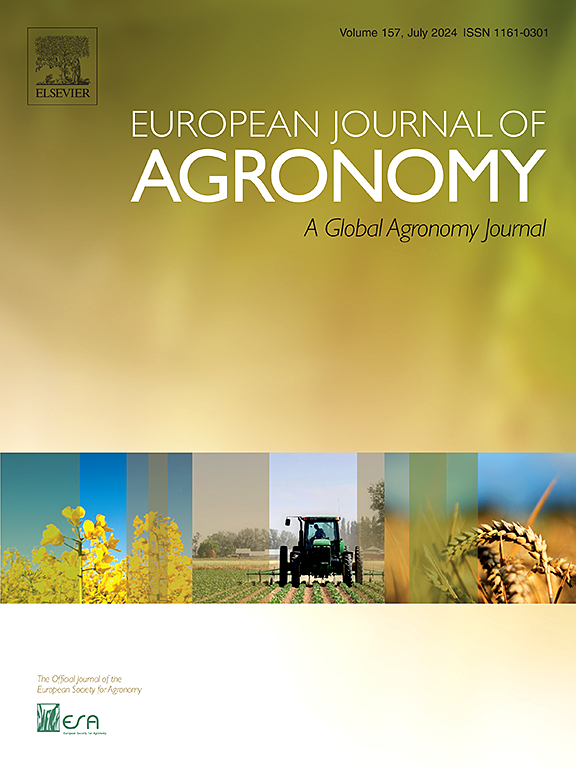田间接种丛枝菌根真菌可提高植物定植率和产量
IF 4.5
1区 农林科学
Q1 AGRONOMY
引用次数: 0
摘要
丛枝菌根真菌(AMF)分布广泛,可与多种植物建立共生关系。AMF作为一种生物肥料,在促进农业可持续发展中发挥着重要作用。但是,目前还缺乏对田间条件下AMF接种效果的综合研究。本研究综合了117篇同行评议的文献和1633个田间观察结果,评估了不同AMF接种处理对植物定殖率和作物生长性能的影响。接种AMF对植株定殖率、氮(N)吸收量、磷(P)吸收量、产量和株高的总体影响均为正。在作物研究中,接种AMF对豆科比禾本科更有利。单次接种比混合接种效果好。Claroideoglomus在显著提高定殖率方面表现突出。然而,与食根菌和漏斗菌相比,其在提高作物产量方面的作用并不明显。在树木接种研究中,混合接种优于单一接种,在作物中观察到的不同真菌属的效果相似。接种AMF对作物吸收磷比吸收氮更有利。产量与定殖呈正相关,与养分吸收密切相关。土壤环境因子主要影响植物定殖率,气候因子主要影响作物产量。接种AMF对植物生长发育有积极影响,但物种差异、气候和土壤条件对其影响较大。因此,本研究为农业可持续生产管理和AMF接种剂的应用提供了有价值的见解。本文章由计算机程序翻译,如有差异,请以英文原文为准。
Inoculation with arbuscular mycorrhizal fungi in the field promotes plant colonization rate and yield
Arbuscular mycorrhizal fungi (AMF) are widely distributed and can establish symbiotic relationships with various plants. AMF plays a critical role as a biological fertilizer in promoting sustainable agriculture. However, comprehensive studies on the effects of AMF inoculation under field conditions are still lacking. This study conducted a global synthesis of 117 peer-reviewed publications with 1633 field observations to assess the effects of different AMF inoculation treatments on plant colonization rate and crop growth performance in field experiments. The overall effect of AMF inoculation on plant colonization rate, nitrogen (N) uptake, phosphorus (P) uptake, yield and plant height demonstrated a positive impact. In crop studies, AMF inoculation was more beneficial for Leguminosae than Gramineae. Single inoculation produced greater effects than mixed inoculation. Claroideoglomus stood out in its ability to significantly boost colonization rates. However, its role in enhancing crop yields was less pronounced when compared to the contributions of Rhizophagus and Funneliformis. In tree inoculation studies, mixed inoculation outperformed single inoculation, with similar effects across fungal genera as observed in crops. AMF inoculation was more beneficial for crop P uptake rather than N uptake. Yield positively correlated with colonization and was closely associated with nutrient uptake. Soil environmental factors mainly affected plant colonization rate, while climate factors influenced crop yield. AMF inoculation positively impacts plant growth and development, but species differences, climate and soil conditions influence its effects. Therefore, this study offers valuable insights into sustainable agricultural production management and the application of AMF inoculants.
求助全文
通过发布文献求助,成功后即可免费获取论文全文。
去求助
来源期刊

European Journal of Agronomy
农林科学-农艺学
CiteScore
8.30
自引率
7.70%
发文量
187
审稿时长
4.5 months
期刊介绍:
The European Journal of Agronomy, the official journal of the European Society for Agronomy, publishes original research papers reporting experimental and theoretical contributions to field-based agronomy and crop science. The journal will consider research at the field level for agricultural, horticultural and tree crops, that uses comprehensive and explanatory approaches. The EJA covers the following topics:
crop physiology
crop production and management including irrigation, fertilization and soil management
agroclimatology and modelling
plant-soil relationships
crop quality and post-harvest physiology
farming and cropping systems
agroecosystems and the environment
crop-weed interactions and management
organic farming
horticultural crops
papers from the European Society for Agronomy bi-annual meetings
In determining the suitability of submitted articles for publication, particular scrutiny is placed on the degree of novelty and significance of the research and the extent to which it adds to existing knowledge in agronomy.
 求助内容:
求助内容: 应助结果提醒方式:
应助结果提醒方式:


